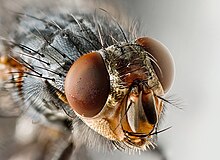Cyclorrhapha
Appearance
| Cyclorrhapha | |
|---|---|

| |
| Musca domestica | |
| Scientific classification | |
| Domain: | Eukaryota |
| Kingdom: | Animalia |
| Phylum: | Arthropoda |
| Class: | Insecta |
| Order: | Diptera |
| Suborder: | Brachycera |
| Infraorder: | Muscomorpha |
| (unranked): | Eremoneura |
| (unranked): | Cyclorrhapha |
| Sections | |
Cyclorrhapha is an unranked taxon within the infraorder Muscomorpha. They are called "Cyclorrhapha" ('circular-seamed flies')[1] with reference to the circular aperture through which the adult escapes the puparium.[2] This is a circumscriptional name that has significant historical familiarity, but in the present classification, this name is synonymous with the more recent "Muscomorpha" [3]
Cyclorrhapha underwent major adaptive radiation that led to the creation of over 72 000 species. These species share multiple attributes such as the 360-degree rotation of the male terminalia.[4]
References
- ^ Borror, Donald J.; Triplehorn, Charles A.; Johnson, Norman F. (2009). An Introduction to the Study of Insects, Sixth Edition. Saunders College Publishing, Harcourt Brace Jovanovich College Publishers, Philadelphia. pp. 501, 548. ISBN 0-03-025397-7.
- ^ Borror, Donald J.; Triplehorn, Charles A.; Johnson, Norman F. (2009). An Introduction to the Study of Insects, Sixth Edition. Saunders College Publishing, Harcourt Brace Jovanovich College Publishers, Philadelphia. p. 548. ISBN 0-03-025397-7.
- ^ Marchiori, Carlos Henrique. "Definition of Diptera Cyclorrhapha or Muscomorpha". Open Journal of Biological Sciences. ISSN 2640-7795.
- ^ de Oliveira, Janaina Lima; Sobrinho-Junior, Iderval Silva; Chahad-Ehlers, Samira; de Brito, Reinaldo Alves (11 September 2017). "Evolutionary coincidence of adaptive changes in exuperantia and the emergence of bicoid in Cyclorrhapha (Diptera)". Development Genes and Evolution. 227 (5): 355–365. doi:10.1007/s00427-017-0594-3. PMC 5597691. PMID 28894941.
